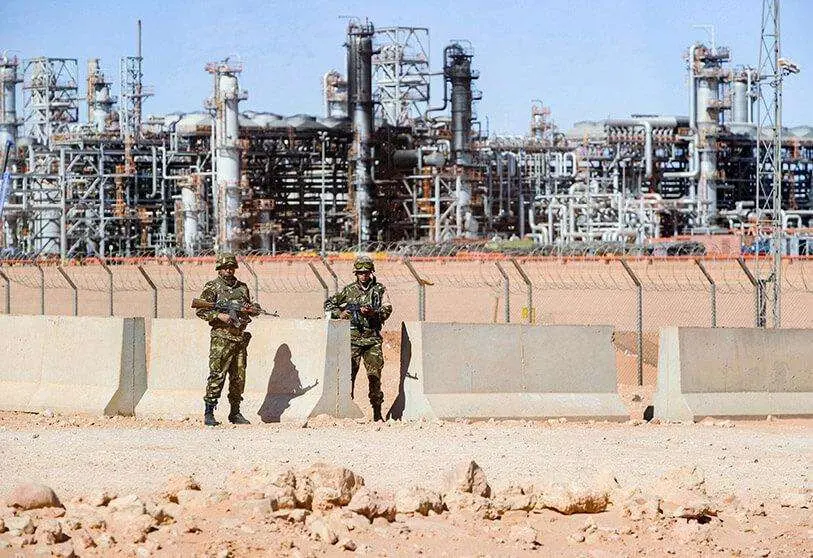Algeria, conditioned by the economy and Putin

Algeria's government has been forced to rectify its attack on Spain when it realised that the struggle against Madrid was extending to a challenge to the European Union, putting at serious risk the cooperation agreement that is essential for Algerians in these times of severe economic and social hardship. And because of pressure from Russia.
The European Union represents the Maghreb country's main trading partner with 46.7% of total Algerian transactions, according to European Commission data from 2019. The reaction of the EU, which backs one of its member states following the threats now denied by Algiers, is similar to what happened just over a year ago when thousands of young Moroccans crossed the border into Ceuta. According to the new Algerian position expressed to the EU authorities, the suspension of the Treaty of Friendship and Good Neighbourliness does not imply breaking off trade relations or cutting off current transactions, and delegates the affected companies to assume the commitments contained in current gas supply contracts. The Ministry of the Interior fears that Algeria could increase its pressure by reducing anti-terrorist cooperation and controlling irregular immigration and the mafias that traffic in everything.
Government sources consulted report their absolute perplexity at the Algerian government's aggressive reaction, which comes several months after President Pedro Sánchez's decision to change Spain's position on the resolution of the Sahara conflict and to consider Morocco's proposal for broad autonomy for the territory under its sovereignty as a good proposal for negotiating a solution to the conflict. A reaction that Algiers has not had with other countries that have taken similar decisions to Spain's, such as France, Germany and the United Kingdom, as well as the United States, the United Arab Emirates and some fifteen African countries.
The Algerian justification was the Spanish prime minister's intervention in Congress this week ratifying the change of position on the Sahara, but EU sources believe that the reaction adopted at this time is due more to an interest that goes beyond the Sahara issue and is more related to Algeria's status as an ally of Russia and its interest in destabilising a European country and justifying the cutting off of gas supplies. Putin's policy in the Sahel, with the operations of Russian mercenaries from the Wagner group in countries such as Mali, raises enormous concerns in Europe. It increases instability in the region caused by terrorist groups.
In this sensitive area, it should be recalled that last October, the Algerian government decided unilaterally and without considering Spain's interests, not to renew the contract to supply gas to Spain through the Maghreb-Europe gas pipeline that passes through Morocco. This decision led to the loss of 6 billion cubic metres, almost half of the Algerian gas imported by Spain, and there was no aggressive reaction from Spain, according to the government sources consulted. At present, Spain has reduced the supply of gas from Algeria from 43% to 24%, so that its relevance for Spanish supply has been significantly reduced, and alternative supplies of liquefied natural gas from the United States, Qatar and Nigeria have been achieved, which are managed at the six regasification bases installed in Spain.
In any case, the Algerian government's position clashes with its own macroeconomic interests by calling into question its relationship with Spain and, therefore, with the European Union, and also with the most pressing needs of the Algerian economy, which for months has been suffering from high inflation, high unemployment, slowing imports and a situation of high risk of social explosion due to the restrictions suffered by most citizens. A revival of the Hirak, the popular Friday mass protests, would represent a new challenge for the Algiers government.
According to economic experts, not even the rise in oil prices will be able to help alleviate the country's current deficit, and with political control of the debt to avoid the need to turn to the International Monetary Fund for financing, given the fear that the conditions for accessing the aid Algeria needs could be linked to the adoption of a series of measures that would force Algeria's leaders to make a series of changes that would mean losing the tight control they exercise over the different economic and financial sectors and purging the high levels of corruption in the public sectors. Moreover, the fear of the Algerian military, led by Said Chengriha, who hold power beyond President Abdelmadjid Tebboune, is that one of the IMF's unwritten conditions would include negotiating a solution to the Sahara conflict. Algerian economic policy depends on accumulated foreign exchange reserves. The reduction in imports means severe hardship for the population due to shortages of milk, oil, medicines, cars and spare parts, and for entrepreneurs who do not have the materials they need for their activities.
Experts in international relations, such as the Spanish diplomat Gustavo de Arístegui, consider that each country can choose the allies it deems appropriate, but it is regrettable that the Algerian government prefers to continue on Russia's side after the invasion of Ukraine. De Arístegui recalls that Algeria is a large country with 50 million inhabitants, very important in the fight against terrorism and in the control of irregular immigration, with large reserves of gas and oil, and with a very notable cultural contribution to the Arab world.
During the war against Jihadist terrorism, which claimed more than 300,000 lives in Algeria in the 1990s, Spain collaborated with the Algerian government in training members of its security forces, especially in explosives deactivation training, which helped save many lives.

